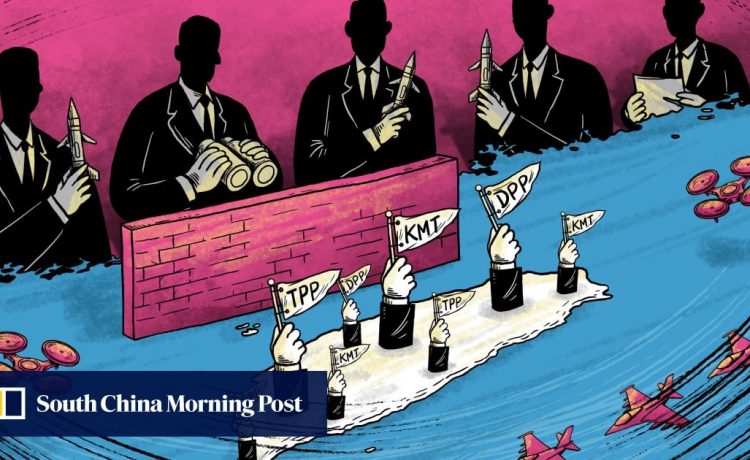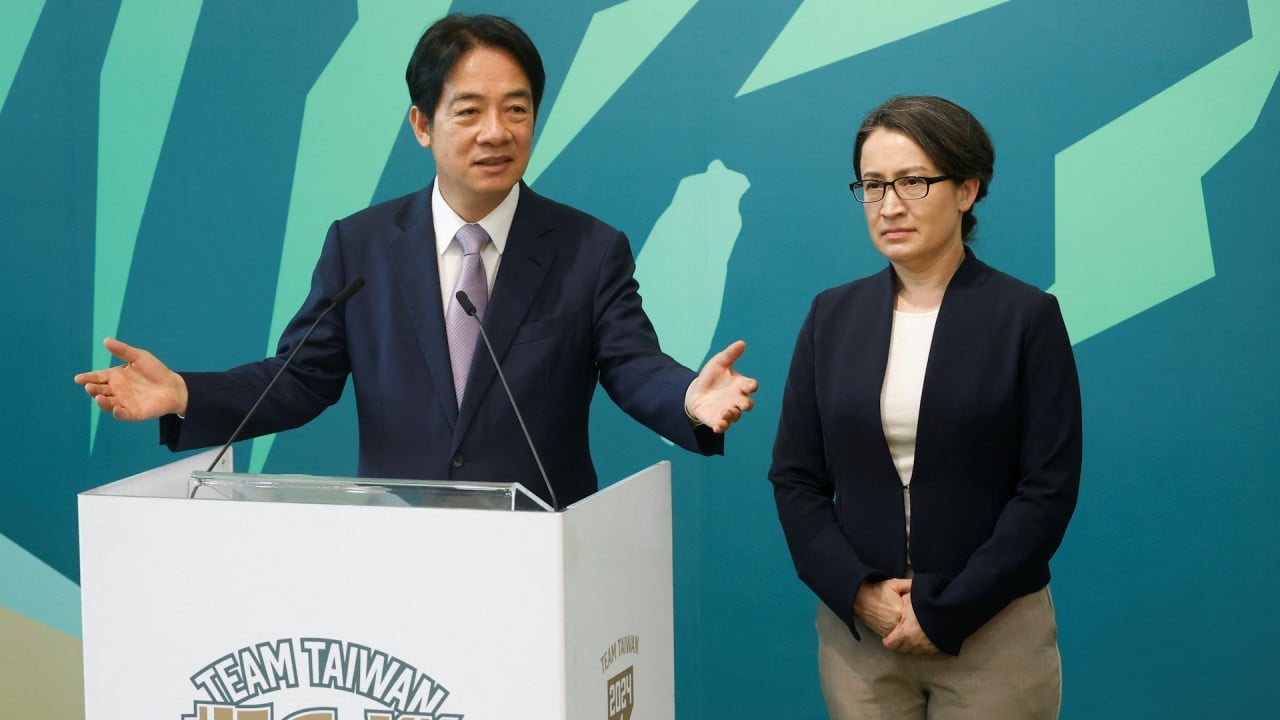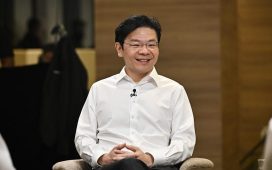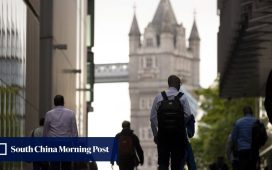“They don’t have many carrots. Hong Kong in 2019, crushing that, it means that [for many in Taiwan and the US] the one-country, two systems is just a dead letter,” said Raymond Kuo, director of the Rand Corporation’s Taiwan Initiative. “So we’re really looking at sticks. But any time the Chinese try to use a stick it just increases support for the DPP and, more broadly, it drives Taiwanese self-identification.
“It just backfires on Beijing.”
An obvious response would be for Beijing to repeat what it did after US Representative Nancy Pelosi, then the speaker of the House, visited Taipei in August 2022 – only more so. At that time, it sent military aircraft and ships across the unofficial median line separating Taiwan from mainland China, fired missiles over the self-governing island, staged a temporary embargo that rattled commercial shipping and launched projectiles into Japan’s exclusive economic zone.
In an apparent effort to tip voting towards the KMT, 12 Chinese fighter jets and several suspected surveillance balloons crossed the median line in recent days while a naval formation, led by the aircraft carrier Shandong, sailed through the Taiwan Strait, Taiwan’s defence ministry said.
But Beijing may expand its playbook.
“I don’t see a lot of value in China doing the same thing again,” said Bonnie Glaser, managing director of the German Marshall Fund of the United States. “Could they do it? Yes, it gives them another opportunity to hone their skills. But China gets more bang for the buck if it does something different.”
Taiwan to fight ‘grey zone warfare’ by seizing mainland Chinese dredgers
Taiwan to fight ‘grey zone warfare’ by seizing mainland Chinese dredgers
In that vein, Beijing could briefly seize or cut off supply routes to small Taiwanese islands a few miles from the mainland or amass troops in nearby Fujian.
While this would further showcase its military might, appeal to Chinese hardliners and give pause to Japan and the Philippines, it risks pushing regional allies further into the US camp. And it could get out of hand if something goes wrong.
“We could see just a fundamental miscalculation post-January,” said Michael Hunzeker, associate professor at George Mason University in Virginia, “which is scary.”
Furthermore, a large-scale troop exercise in Fujian could benefit US intelligence, which knew more about Moscow’s intentions than many Russian officers did before the February 2022 invasion of Ukraine.

Grey zone options tend to offer deniability, and drone flights over Taiwan’s main island would be less provocative than a Chinese jet fighter.
After Pelosi’s visit, Beijing announced “disciplinary” sanctions against two Taiwanese foundations and blocked imports of Taiwanese fruit and fish products, biscuits and pastries, citing environmental, pesticide residue and Covid-19 concerns.
The use of economic sanctions diminishes the risk of a military miscalculation, squeezes producer groups able to pressure Taiwanese politicians and highlights the might of China’s massive economy.
Mainland China has made a multi-decade effort to contain Taiwan, and its tools have expanded along with its wealth, military prowess and diplomatic clout. Those have helped reduce the number of countries that recognise Taiwan diplomatically and block Taiwan’s participation in international entities such as the World Health Organization. But its size and assertiveness have also engendered more resistance.
Another Beijing option: quarantine commercial ships headed for Taiwan, something it has hinted at doing.
US moves to expand Taiwan’s global presence, citing ‘attempts to exclude’ island
US moves to expand Taiwan’s global presence, citing ‘attempts to exclude’ island
“This really got people’s attention,” said Glaser.
“They could decide to randomly force shipping to go to a port in mainland China before docking in Taiwan. It’s a good way to assert soft sovereignty. It would be very disruptive. It would obviously cause insurance rates to spike for shipping. And it would wreak havoc with supply chains.”
The area is highly vulnerable to such pressure tactics, with some 90 per cent of Taiwan’s trade passing through its four main ports and approximately one-third of global trade transiting through the South China Sea.
“It’s not a blockade, which would be an act of war, but it would send a signal,” said a former intelligence official with extensive East Asia experience. “It would put Lai on notice to operate carefully.”
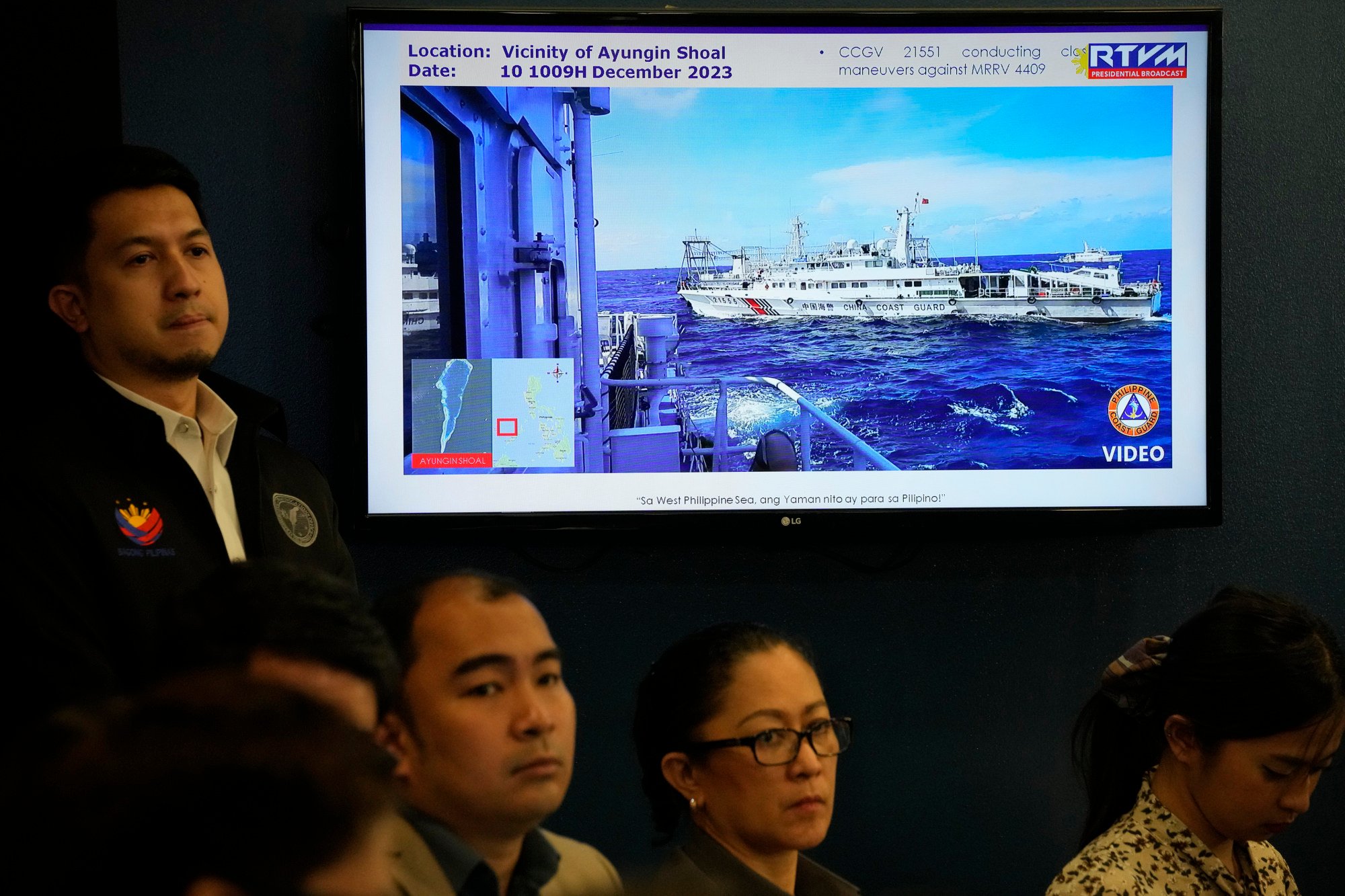
But this could provoke anger among China’s major global trading partners, making Beijing appear less trustworthy at a time when the swooning Chinese economy needs foreign investment.
Analysts stress that each of these options can be used in various combinations and calibrated in intensity.
Some US experts involved in “Track 2” dialogues – meetings of current and former officials and analysts that allow each side to communicate informally – said they doubted Beijing has decided how to respond to any DPP victory. But ministries have likely offered up a menu of options to “punish” Taiwan “separatists” should the election go against mainland China’s interests, they added.
Taiwan poll: DPP senses win with Lai-Hsiao ticket but Beijing might see ‘war’
Taiwan poll: DPP senses win with Lai-Hsiao ticket but Beijing might see ‘war’
In early December, Taiwanese intelligence authorities reported that senior officials from various agencies, including China’s defence ministry and the Taiwan Affairs Office, had met to “coordinate” Beijing’s efforts to influence Taiwan’s elections.
Another option for Beijing would be to do relatively little and play the long game. China’s military might is growing rapidly, democracies can be fickle and some US Republican hardliners have recently questioned coming to Taiwan’s defence at all.
But Beijing does not have a long track record of standing down over perceived slights.
“Invariably there’s an aspect of China’s behaviour that remains blunt force trauma,” said Rupert Hammond-Chambers, president of the Washington-based US-Taiwan Business Council. “But China is also constantly adjusting certain aspects of the pressure they place on Taiwan.”
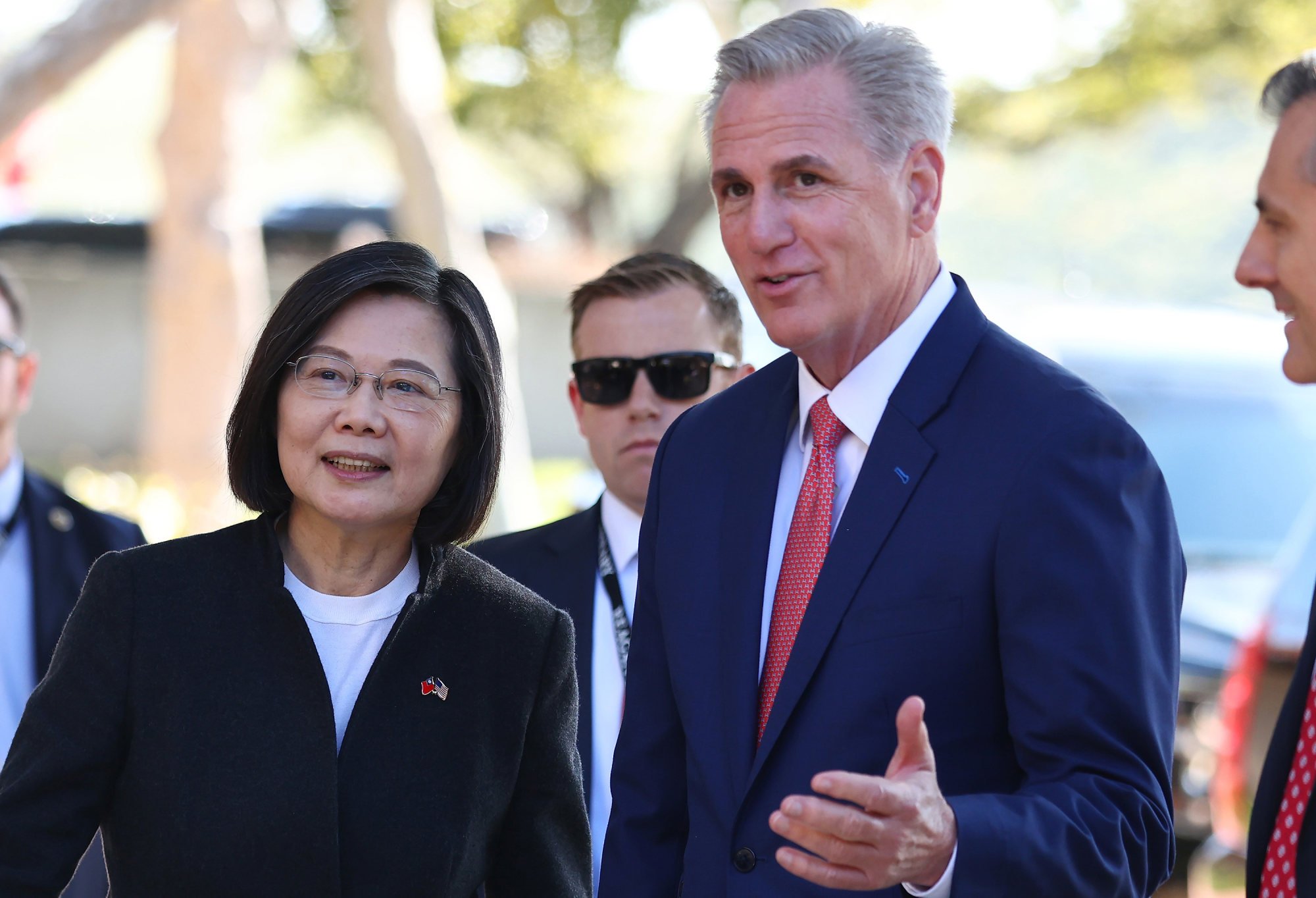
A recent example saw Beijing exploit Taiwanese fears that Washington only cared about semiconductors and would not come to Taipei’s defence if invaded. Polling showed a 10 percentage point drop in America’s standing after it declined to directly defend Ukraine, which is not a Nato member.
“China hammered at that, that the US only wants to take your crown jewels,” said Hammond-Chambers. “There was more thought behind that, more long term. I don’t like it, but it’s clever.”
China also may expect US cooperation after the summit between presidents Xi Jinping and Joe Biden in California in November. When Lai made a US “stopover” in August, he kept a low profile, did not meet with lawmakers and avoided any provocative statements under pressure from the White House.
But Beijing may not appreciate the US distinction between pre-election neutrality and post-election support for any winner, analysts said.
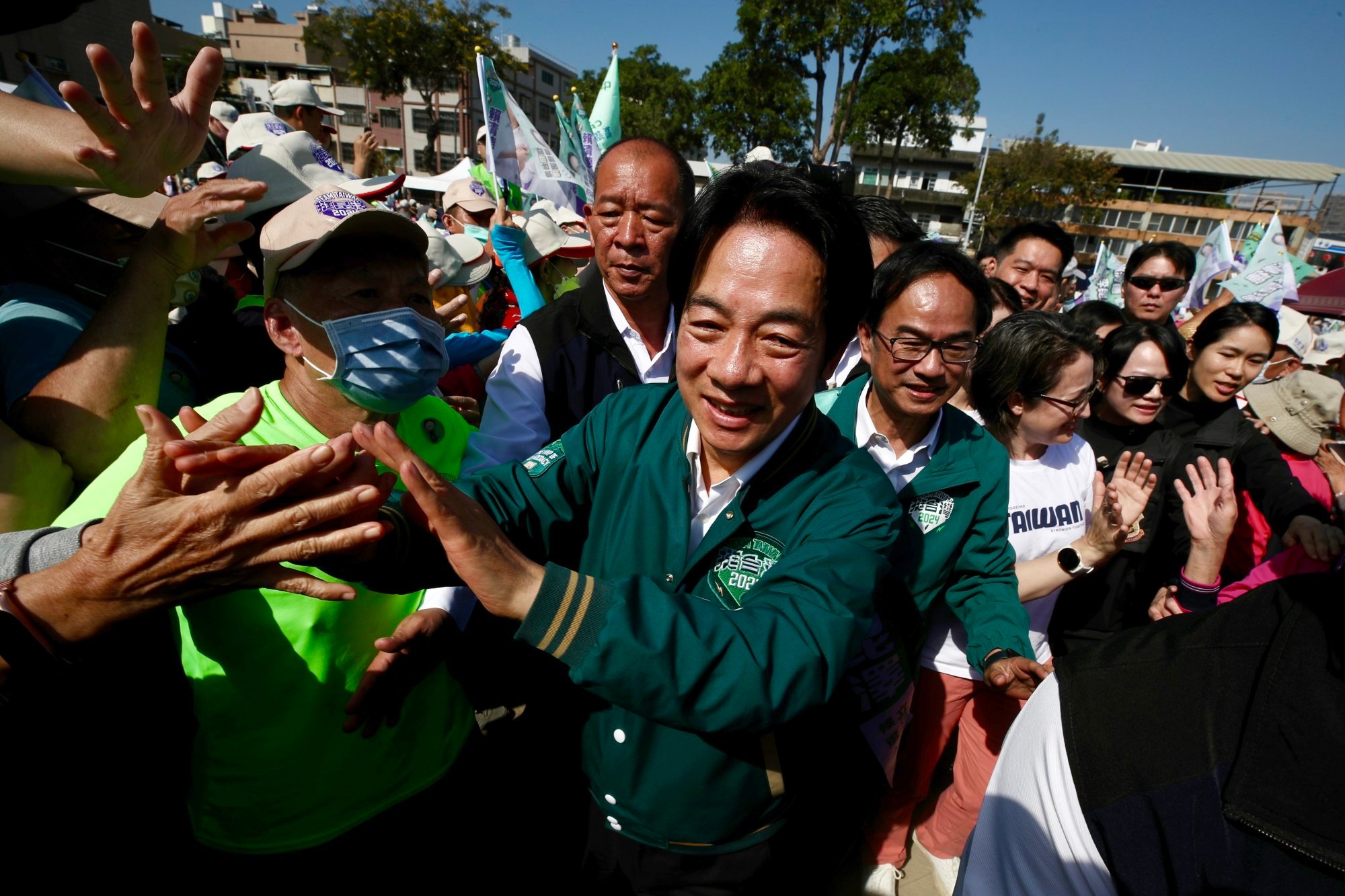
China can also take some solace in the expected strong opposition results in Taiwan’s parliament, the Legislative Yuan, a check on DPP power.
“So if I were the Chinese, instead of trying the heavy hand,” said Michael Fonte, director of the DPP’s US mission, “they would want to work that lever before they start anything beyond that.”
Beijing also may opt to stand down until it takes stock of the new president. “It’s not the election. It’s what he might say afterward,” said a source close to the Chinese government.
KMT’s Hou pledges strong military and talks for Taiwan to keep Beijing at bay
KMT’s Hou pledges strong military and talks for Taiwan to keep Beijing at bay
A longer-term complication, analysts say, would see the KMT win, only to pursue a more independence-leaning course in line with voter sentiment – undercutting Beijing’s belief that the DPP is solely responsible over shifting Taiwanese sentiment.
A poll in September found that 48.9 per cent of Taiwanese favoured formal independence, with less than 27 per cent in support of maintaining the status quo.
“Maybe in the long run, a DPP victory in 2024 isn’t the worst outcome,” said Hunzeker. “The worst outcome could be if KMT wins the election in 2024 and Beijing concludes, we can’t even rely on the KMT.”
Hunzeker added that November’s Biden-Xi summit hopefully established some limits on how far the mainland will go in reacting to the Taiwan election.
“I cannot even venture a guess where that threshold is, but my guess is neither can Chinese planners,” he said. “No one knows exactly when we turn from a very reasonable assessment of the scenario to an unreasonable running for the exits. And that can happen quickly.”

